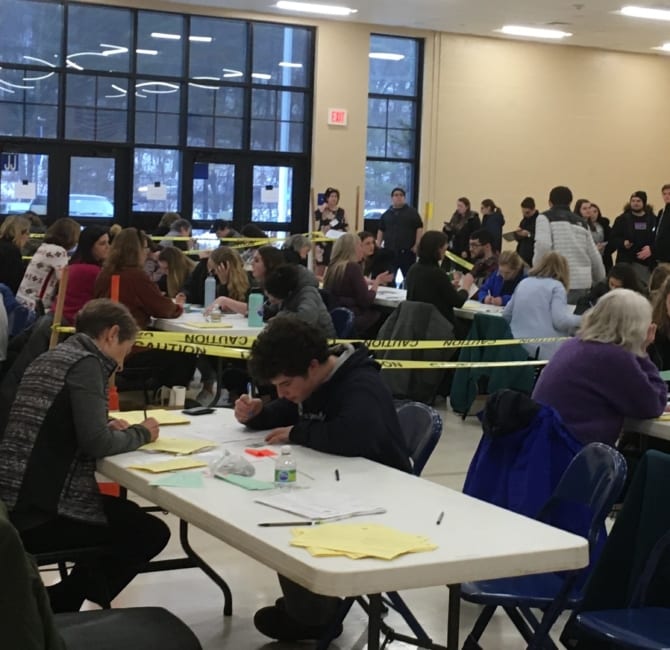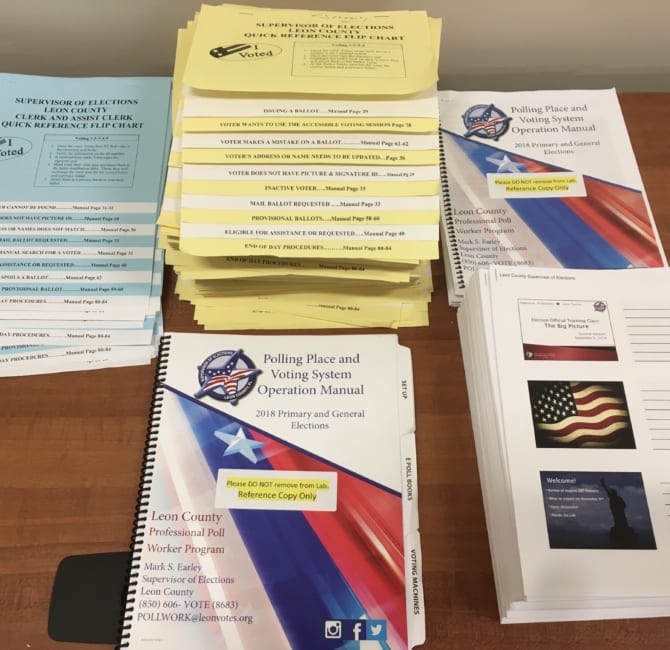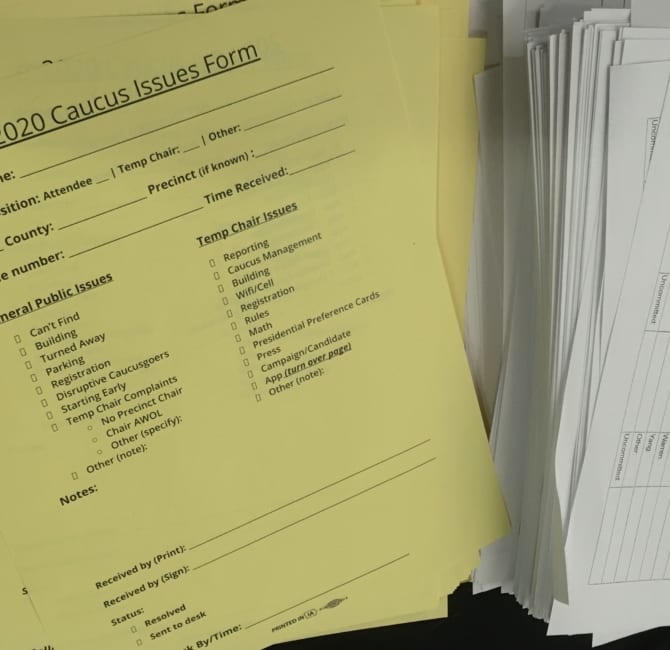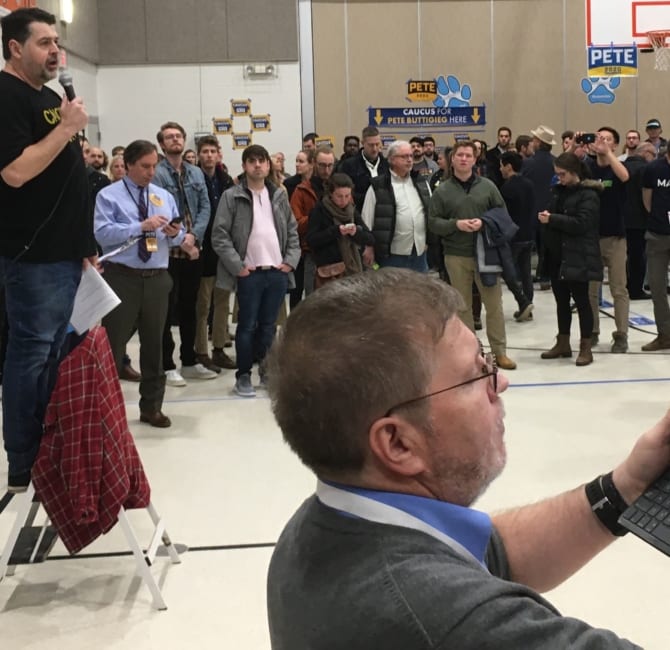Wisconsin Stunner: The Highest State and Federal Courts Back GOP Voter Suppression
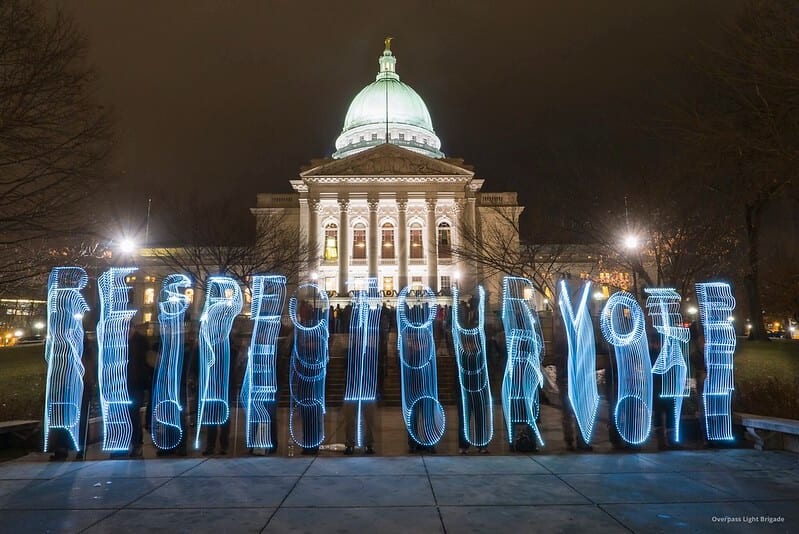
(Photo / ‘Respect our vote’ Capitol protest motion copy, Creative Commons 2.0)
The Republican Party affirmed with startling clarity on Monday that preserving political power was a higher priority than protecting public health or enabling voters to cast ballots that will be counted in the COVID-19 era.
The stage for this stunning partisan display embracing voter suppression was a constitutional crisis that erupted in Wisconsin, a day before scheduled statewide elections on April 7 for its 2020 presidential primary, a state Supreme Court seat, and contests for hundreds of local offices.
The election will continue on April 7, but the reverberations from Monday rulings by Wisconsin’s Supreme Court and the U.S. Supreme Court later in the day in a related lawsuit have set down markers that suggest that securing voting rights in a pandemic is anything but assured—especially if anti-participatory state laws and voting procedures will be upheld by majorities on the highest courts.
Right-wing court majorities signal Republicans can use every means to make voting more difficult to preserve GOP power—even in a pandemic.
Efforts by Democrats to postpone in-person voting and extend voting by mail due to the pandemic were rejected by conservative majorities on the Wisconsin Supreme Court and on the U.S. Supreme Court. In separate rulings, both courts sided with the Republican National Committee and Wisconsin Republicans.
“The Court’s order, I fear, will result in massive disenfranchisement,” Supreme Court Justice Ruth Bader Ginsburg wrote in a dissent signed by the court’s three other liberal justices. “A voter cannot deliver for postmarking a ballot she has not received. Yet tens of thousands of voters who timely requested ballots are unlikely to receive them by April 7, the Court’s postmark deadline [to return ballots].”
While this ideological split may not be new in electoral politics, especially in voting right cases where conservatives seek strict laws limiting participation and liberals seek flexibility to enfranchise voters, it was a “bad sign” for the climate heading into elections in the fall, said Rick Hasen, ElectionLawBlog.org founder and a nationally known constitutional scholar.
“It is a very bad sign for November that the Court could not come together and find some form of compromise here in the midst of a global pandemic unlike anything we have seen in our lifetimes,” he wrote. “Like the Wisconsin Supreme Court, the U.S. Supreme Court divided along partisan and ideological lines.”
The courts’ rulings capped a day of high drama and a state constitutional crisis.
On Monday afternoon, Wisconsin’s Democratic Gov. Tony Evers issued an executive order to postpone in-person voting and extend the deadline for absentee ballots to be mailed in, citing the pandemic. But the state’s Republican majority legislature challenged Evers’ order before the conservative-led Wisconsin Supreme Court. The GOP legislative leadership issued a statement telling local officials to keep planning for Tuesday’s election, creating great tension and uncertainty as the Democratic governor and Republican legislature headed into court.
By a 4-2 vote later in the day, the Wisconsin Supreme Court ordered the in-person voting to continue, even as hundreds of polling places were not going to open after poll workers withdrew due to the pandemic. Only five of Milwaukee’s 180 polls would be opened in that non-white epicenter, ElectionLawBlog.org reported.
“The April 7 Spring Election and Presidential Preference Primary is occurring as scheduled,” a headline on the Wisconsin Elections Commission (WEC) website said after the Wisconsin Supreme Court ruling. The WEC said that 1,275,254 absentee ballots had been requested by voters and that 724,777 had been returned by April 6. Other reports by academics citing WEC data said that local officials had yet to mail out 10,000 ballots. Meanwhile, half-a-million ballots had yet to return.
The Wisconsin Supreme Court’s decision was not entirely unexpected, because in 2016 outgoing Republican Gov. Scott Walker and the GOP-led legislature stripped many authorities from the incoming Democratic governor. Democrats had fought those laws, enacted after the 2016 election in a lame-duck session, but lost.
“This is a real constitutional showdown,” said Kevin Kennedy, the ex-executive director of Wisconsin’s Government Accountability Board, which oversaw the elections for decades until Walker and GOP legislators dismantled the board.
“When I was there I thought the governor had the power to do something [like postpone an election in a health emergency], but in 2016 the Legislature severely restricted the governor’s power,” Kennedy said. “He [Walker] signed all of these laws that he would never have tolerated as restrictions on his power. Even the Attorney General can’t settle a lawsuit without approval from the legislature.”
However, shortly after the Wisconsin Supreme Court ruled on Monday, the U.S. Supreme Court weighed in—responding to another lawsuit filed late on Friday by the Republican National Committee and Wisconsin’s GOP-led legislature. The Republican majority was created by gerrymandering after the 2010 census.
Earlier on Friday, a federal district court with a judge appointed by President Obama extended the mail-in balloting deadline by a week and said that absentee voters did not have to find a witness to sign their ballots.
That prop-voter ruling was appealed by Republicans to a federal circuit court, which reinstated the witness requirement but kept the week-long extension for absentee ballots to be returned. The RNC then appealed the extension to the U.S. Supreme Court, arguing Wisconsin voters would be voting after Election Day.
The Republicans argued that no special exceptions should be made, even though the pandemic had led local officials to send out six times as many vote-by-mail ballots as in the 2018 election—and by late Monday more than 500,000 hadn’t been returned, the WEC said. The Supreme Court’s conservative bloc agreed.
“The Court’s [majority] suggestion that the current situation is not ‘substantially different’ from ‘an ordinary election’ boggles the mind,” Ginsburg’s dissent said. “Some 150,000 requests for absentee ballots have been processed since Thursday, state records indicate. The surge in absentee-ballot requests has overwhelmed election officials, who face a huge backlog in sending ballots.”
“It is among the most cynical decisions I have read from this Court—devoid of even the pretense of engaging with the reality that this decision will mean one of two things for many WI voters: either they will risk their health & lives to vote, or they will be disenfranchised,” tweeted Sherrilyn Ifill, president and lead counsel of the NAACP Legal Defense and Educational Fund.
A Troubling Precedent
In the coming days, it will become clear how many thousands of voters will see their absentee ballots rejected because they arrived too late to be filled in and returned. But Monday’s high court rulings will resonate in other 2020 swing states that are wrestling with expanding absentee balloting in response to the pandemic.
It is important to note that the partisan divide that led to Wisconsin’s constitutional crisis, where a Democratic executive branch and a Republican-led legislature could not agree on voting reforms, is not unusual—although the Wisconsin governor’s weakened authority is somewhat unique. The 2020 swing states of Michigan, Pennsylvania and North Carolina all have different parties controlling their executive and legislative branches, and already are clashing over expanding absentee voting in response to the pandemic.
Analysts in Wisconsin, including conservatives such as Charlie Sykes, said that no one should doubt that the Wisconsin GOP was putting partisan power before the public interest. Sykes noted that Republicans believe they can win a state Supreme Court seat if the April 7 election continued and other voting options were curtailed.
“In Wisconsin, the GOP would rather endanger people’s lives and have a clusterfuck election, so long as it gives them a chance at clinging to a piece of government power,” he wrote Monday on TheBulwark.com, which Sykes founded and where he is an editor at large. “Don’t be confused about any [of] the motivations here: [The] GOP position is about power, not ideology.”
Sykes summarized the crisis’ backdrop:
“While the national media will focus on the presidential primary vote (polls show Joe Biden with a big lead over Bernie Sanders), the real action centers on the state Supreme Court. Although technically non-partisan, the elections for the high court have become intensely partisan, and conservatives now hold a 5-2 majority on the high court.
“For several years, Republicans have worried about re-electing conservative incumbent Dan Kelly, who was appointed to his seat by former Governor Scott Walker. When legislators realized that his election was set for the same day as the presidential primary—which was expected to bring out hordes of Democrat-leaning voters—they initially considered moving the [Supreme Court] election to a different day to give Kelly a better chance.
“That idea fizzled, but until the coronavirus hit the U.S., there was widespread anxiety that the Democratic turnout for the active Biden-Bernie race would swamp conservative votes and doom Kelly. Biden’s sweep and [the] spread of the pandemic have dramatically changed the shape of the race to the point that Republicans are now convinced that, if they hold the vote on Tuesday, it means they have a shot to re-elect Kelly.”
One case before the Wisconsin Supreme Court that is now deadlocked in a 3-to-3 vote and would likely be affected by Kelly’s re-election concerns purging 240,000 voters from voter rolls, most of them Democrats, historian and author Heather Cox Richardson noted on April 6.
“This [potential purge] will increase Trump’s chances of winning the state in 2020, and Wisconsin is likely key to a victory in the Electoral College,” she wrote. “This is why I watch the minutia[e] of politics so carefully. It’s hard to imagine that the election of a state judge in Wisconsin matters to our nation of fifty states and 330 million people, but it does. Oh, boy, does it.”
Wider Repercussions
Monday’s rulings by the Wisconsin and U.S. Supreme Courts may be the opening round in many courtroom fights as states wrestle with conducting elections in the pandemic. The U.S. Constitution says that states have almost full authority to run their elections—short of any direct violations of federal constitutional rights or congressional law. But the two rulings show that protecting voting rights amid public emergencies matters less to conservative judges than deferring to prior legislative action and established voting rules—however anti-democratic.
“The question here is whether tens of thousands of Wisconsin citizens can vote safely in the midst of a pandemic,” Justice Ginsburg’s dissent said. “Under the District Court’s order [on Friday], they would be able to do so. Even if they receive their absentee ballot in the days immediately following election day, they could return it. With the [Court] majority’s stay in place, that will not be possible. Either they [voters] will have to brave the polls, endangering their own and others’ safety. Or they will lose their right to vote, through no fault of their own.”
“That is a matter of utmost importance—to the constitutional rights of Wisconsin’s citizens, the integrity of the State’s election process, and in this most extraordinary time, the health of the Nation,” Ginsburg wrote, concluding the dissent.
Perhaps the best that could be said about Monday’s court rulings is that they have exposed the lengths to which the GOP partisans and right-wing justices will go in 2020 to preserve Republican power by suppressing voters.
The only remedy is for their opponents to vote in such big volumes that there can be no ambiguity in the outcome, even if that means facing barriers intended to disenfranchise voters and to disqualify their ballots from counting.
Also Available on: www.laprogressive.com



